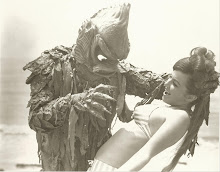
When Blood Feast, generally credited as the first American gore film, opened in the fall of 1963, drive-in audiences responded by lining up for miles to see it, and local bluenoses reacted with shock and horror at the film's crude gore and crass title. In Sarasota, Fla., just a few hours drive from the Miami locales where the movie was made, the film was actually pulled from the Ritz Theater by court order after a group of 12 concerned citizens signed a petition to have the film shut down after one showing. The petition, filed in court by attorney William E. Robertson, declared that the film depicted "sadistic and inhuman behavior."
A hearing was originally scheduled on the case on Nov. 22, 1963, but postponed -- the court was closed to mark the observance of President John F. Kennedy's funeral services.
The ban lasted well into 1964. In March, the District Court of Appeals in Lakeland reversed Judge Robert Willis' issuance of a temporary injunction against the film, stating that the judge had abused his discretionary powers by denying the theater's petition for setting a bond in the restraining order. The plaintiffs appealed the to the Florida Supreme Court, but the injunction was eventually dismissed by a circuit judge in May of 1965 after months of inactivity.
Blood Feast ran into similar problems all across the country. In East Haven, Conn., a drive-in canceled the film after a group of police officers viewed it and found it objectionable. The Pittsburgh Press refused to run advertisements for the film, prompting a group of local drive-in owners to sue the paper. The Armstrong Circuit in Ohio canceled Blood Feast after patrons raised a stink about the trailer (which played to a largely family audience during a showing of Spencer's Mountain and The Wheeler Dealers in Toledo). In Philadelphia, the manager of the Nixon Theater was arrested for exhibiting an obscene film and contributing to the delinquency of a minor after screening Blood Feast for an audience of teenagers in 1964.
The ban in Sarasota prompted a number of letters to the editor of the local Herald-Tribune, both for and against the injunction.
In an interview with the paper in March 1964, producer David Friedman noted that the film had played in 45 states, but Sarasota was the only city where legal action had been taken. (He also noted that the film had outgrossed Cleopatra -- in Belgium.)
"At first I was very amused by the injunction," Friedman said. "But then when the case kept getting pushed back, I became annoyed. Legally my company hasn't entered into it, but if Florida Theaters decides to drop the case, I'll have no other choice but take action with my own lawyers, for the simple reason that no one person or a group has a right to play God. If they want to act as a board of censors, then fine, but first let the city establish such a board by ordinance and then let those 12 run for it in an election."
Sarasota resident John Higgins chimed in with a letter published in the Herald-Tribune on June 2, defending the film. Here's the closing of the letter:
"Sometime [sic] ago in Miami three people were so disgusted with a public display that they went to court to have its showing prohibited, because, with the dictatorial complex, it matters little whether the subject be sacred or profane. The three people could not show that the display could arouse the passions of even the weakest mind. Nevertheless they won their case and the Christmas Nativity scene was removed from the lawn of the public school.
"If that can happen to a gory movie and at the other end of the spectrum it can happen to the innocent pastoral scene of the Nativity, can it be wondered that we ask, "By what right?" What about all the possibilities between these two extremes? The injunctive approach is a dangerous one. If each little group took its views to court and had injunctions issued to suit its particular views -- where would democracy be?"




No comments:
Post a Comment